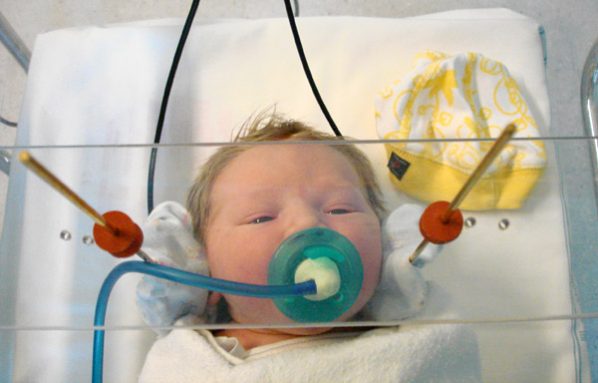Learning language before birth
Scientists find that newborns can recognize vowel sounds similar to those spoken by their parents

New babies eat, sleep, cry, poop — and listen. But their eavesdropping begins before birth and may include language lessons, says a new study. Scientists believe such early learning may help babies quickly understand their parents.
Christine Moon is a psychologist at Pacific Lutheran University in Tacoma, Wash. She led the new study, to be published in February. “It seems that there is some prenatal learning of speech sounds, but we do not yet know how much,” she told Science News.
A prenatal event happens before birth. Scientists have known that about 10 weeks before birth, a fetus can hear sounds outside the womb. Those sounds include the volume and rhythm of a person’s voice.
But Moon found evidence that fetuses may also be starting to learn language itself. Moon and her coworkers tested whether newborns could detect differences in vowel sounds. These sounds are the loudest in human speech.
Her team reports that newborns responded one way when they heard sounds like those from their parents’ language. And the newborns responded another way when they heard sounds like those from a foreign language. This was true among U.S. and Swedish babies who listened to sounds similar to English vowels and Swedish vowels. These responses show that shortly after birth, babies can group together familiar speech sounds, Moon told Science News.
It might seem difficult for scientists to learn anything about babies, given their limited ability to communicate. But for their experiment, Moon and her coworkers relied on special pacifiers attached to computers. Pacifiers are rubber or plastic gizmos shaped like a nipple that help soothe a little one. (You might know a pacifier as a “binkey,” a “plug,” or a “passy.”)
The researchers studied 80 infants ranging from 7 to 75 hours old. Half of those babies lived in the United States, the other half in Sweden. Each baby had a pair of headphones nearby. When a baby sucked on the pacifier, the action triggered the attached computer to send sounds through the headphones.
The babies listened to 17 sounds similar to the long e in English, heard in the word fee, for example. They also listened to 17 sounds similar to a Swedish vowel that sounds like yeh. If a baby stopped sucking for at least one second, the sound stopped.
Moon’s team kept track of each baby’s responses. American babies were more likely to continue sucking on their pacifiers when they heard Swedish vowel sounds than when they heard English vowel sounds. Swedish babies were more likely to continuing sucking on their pacifiers when American vowels were played.
The babies’ responses indicate that they stopped to pay more attention to vowel sounds made by their parents. That’s probably because those sounds were familiar and potentially meaningful.
Power Words
psychology The study of the human mind and its connection to behavior.
prenatal Before birth.
fetus An unborn offspring of a mammal, in particular an unborn human baby more than eight weeks after conception.
pacifier A rubber or plastic nipple for a baby to suck on.
rhythm A strong, regular, repeated pattern of movement or sound.
womb The organ in female mammals in which a fetus develops prior to birth.







